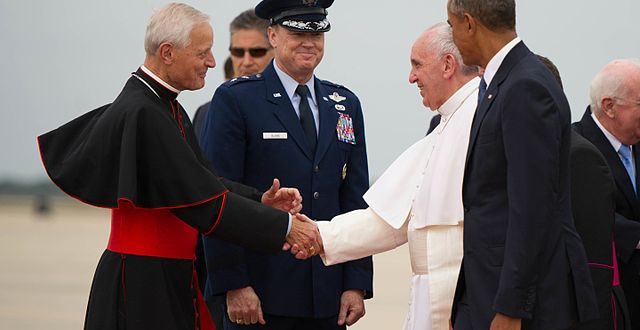Archbishop Charles J. Chaput: On the Babylonian Captivity of the Church
October 13, 2017Founder’s Quote
October 14, 2017
It is his view of the death penalty, not theirs, that departs from Catholic teaching.
By George Neumayr, American Spectator, October 13, 2017
For decades, liberal Catholics have relativized Catholic dogma and dogmatized relativism. Pope Francis is the champion of this movement. One moment, he is pushing Jesuitical situation ethics, which is an outgrowth of moral relativism; in the next, he is hectoring Catholics that his flaky political opinions constitute “Catholic social teaching.” To adulterers, he says: Go and sin some more. To people who fail to recycle, he has urged confession and repentance.
To more fanfare from the media this week, he declared the death penalty “inadmissible” everywhere and always and says that he wants to change the catechism to reflect this absolutist view. Never mind that his entire pontificate has been devoted to saying that life is too murky for “black and white” moral norms. Somehow he has managed to find one.
Not a single one of his predecessors took the position that the death penalty is intrinsically unjust. But he does and says that anyone who disagrees is a proponent of “vengeance.” He claims a deeper understanding of Christian imperatives, even though the origin of his pacifism isn’t Christian. It springs not from the moral absolutes of the Christian tradition but from the relativistic humanism contained within post-Enlightenment moral and political philosophy. He is rendering not to Christ or Caesar but to Cesare Beccaria, the 18th-century father of left-wing criminology who set the modern world on its pro-prisoner course.
St. Thomas Aquinas would have found the pope’s musings on the death penalty moronic. But Beccaria would have understood them perfectly. A measure of the pope’s fatuousness is that he opposes not only the death penalty but also lifetime imprisonment, a position that not even the most liberal of liberals Democrats takes. Pope Francis has called lifetime imprisonment a “form of torture” and a “hidden death penalty.”
On the subject of penology, Francis sounds less like a pope than a lawyer for the ACLU. He thinks, for example, that prisons should be run by women. “When I go to a city, I like to visit prisons; I have already visited a number of them. Without wishing to detract from anyone, I would say that my general impression is that prisons run by women are better run,” he said to a group of judges in 2016. “I mention it as a personal experience which may be worth thinking about. Here in Italy, many prisons are run by women. Many of them are young; they are respected and enjoy a good rapport with the prisoners.”
In 2016, Pope Francis held a “jubilee of prisoners” at St. Peter’s Basilica, an outing for felons to the Vatican. Pope Francis used the occasion to call for prisoner amnesty and opined on the supposedly benighted attitudes of the public: “Sometimes, a certain hypocrisy leads to people considering you only as wrongdoers, for whom prison is the sole answer. We don’t think about the possibility that people can change their lives. We put little trust in rehabilitation.… But in this way we forget that we are all sinners and often, without being aware of it, we too are prisoners.”
Just as he equates socialism with love of the poor, so he equates left-wing penology with love of prisoners. It never occurs to him that he is impeding their spiritual recovery by treating them as victims of an unjust system. Where his predecessors spoke of the acceptance of just punishments as “atonement,” he speaks of “prisoner rights.”
It was reported this week that prisoners may have taken his calls for amnesty too seriously. According to the Italian press, a couple of prisoners invited to lunch with the pope in Bologna “took advantage of the occasion to escape.” The lunch was on October 1 and the two prisoners are still at large. It is not clear if they snuck out before or after lunch.
Such is the low comedy of this pontificate. But what’s not funny is that he is flirting with proposals to formalize his flakiness in Church teaching. With his blessing, Vatican officials are looking at discarding the Church’s “just war” teaching and they are itching to rewrite sections of the catechism along politically liberal lines. Cardinal Peter Turkson, one of his closest advisers, speaks openly of his desire to enshrine pacifism in the catechism, calling the disposal of the teachings of Aquinas and Augustine on war “very legitimate.”




